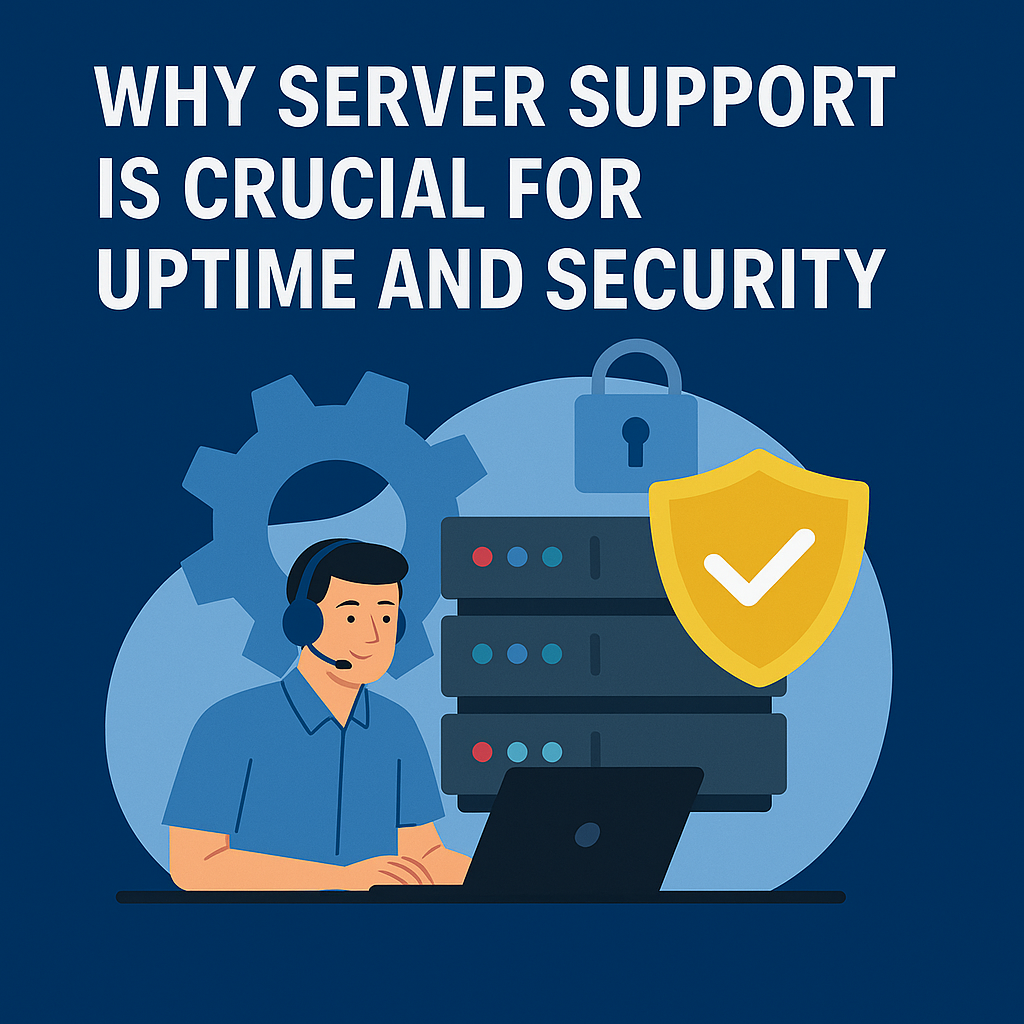Boost Your Business with Server Maintenance Tips for Maximum Uptime

In the digital age, businesses increasingly depend on robust servers to power operations. From running a VoIP provider business to managing IT support for desktops or enabling small business equipment finance platforms, server maintenance is critical. Professional server support ensures uptime, protects data, and delivers a seamless experience to clients and employees alike.
Downtime is more than simply an inconvenience; it poses a threat to your reputation and revenue. Proactively managing your server infrastructure is a strategic investment that fosters operational reliability and customer satisfaction. This comprehensive guide provides actionable tips for effective server maintenance to ensure maximum uptime and long-term growth.
What is Server Maintenance?
Server maintenance involves regular updates, monitoring, and troubleshooting to ensure that your servers perform efficiently and securely. These activities are the backbone of any server management company or IT services provider.
Why Does It Matter for Your Business?
- VoIP Provider Business: Uninterrupted communication is vital, and server issues can lead to dropped calls and dissatisfied clients.
- Small Business Equipment Finance: Downtime can disrupt transactions, affecting both trust and revenue.
- IT Support Desktop Services: Slow or malfunctioning servers hinder productivity and frustrate users.
Understanding the Importance of Uptime
What is Uptime?
Uptime is the percentage of time your server remains operational without interruptions. The industry standard for most services is 99.9%, but achieving “five nines” (99.999%) uptime is ideal for critical systems.
The Business Case for High Uptime
Every moment of server downtime can translate to:
- Lost Revenue: Inability to process financial transactions or complete VoIP calls.
- Decreased Productivity: Employees relying on IT systems cannot work efficiently.
- Reputation Damage: Customers lose trust in unreliable services.
Investing in professional server support and rigorous maintenance minimizes these risks, ensuring your business stays competitive.
Top Server Maintenance Tips for Maximum Uptime
1. Monitor Server Performance Continuously
Monitoring is the foundation of server maintenance. For businesses like VoIP providers or IT support companies, real-time performance insights help prevent issues before they escalate.
Key Metrics to Track:
- CPU utilization: Excessive utilization may suggest a need for upgrades or optimization.
- Memory Utilization: Ensure there’s adequate RAM for peak loads.
- Disk Space: Running out of storage can cripple operations.
- Network Latency: Critical for VoIP calls and financial systems.
Tools for Monitoring:
- Nagios: Open-source and customizable.
- SolarWinds Server & Application Monitor: Comprehensive performance tracking.
- Zabbix: Ideal for scalable monitoring.
2. Schedule Regular Maintenance Check-Ups
Routine maintenance ensures your servers stay in top shape. Set a schedule to inspect, clean, and update server components, both hardware and software.
Tasks to Include:
- Log Analysis: Review logs for irregularities or errors.
- Update Firmware: Prevent compatibility issues with newer software.
- Clean Hardware: Remove dust and debris from server rooms to avoid overheating.
A server management company can handle these tasks if you lack an in-house IT team.
3. Implement Redundant Backup Solutions
No server maintenance strategy is complete without robust backup systems. Backups protect your data and enable quick recovery in case of hardware failure or cyberattacks.
Backup Best Practices:
- Automate the Process: Use software to schedule regular backups.
- Store in Multiple Locations: Combine local backups with cloud-based storage for added safety.
- Perform Test Restorations: Regularly verify that your backups work as expected.
For small businesses offering equipment finance or VoIP services, losing customer data can have severe repercussions.
4. Regularly Update Software and Security Protocols
Outdated software is a major source of security problems. Businesses in sectors like finance or VoIP services need secure servers to meet compliance standards and build customer trust.
Steps to Stay Updated:
- Install operating system updates promptly.
- Apply patches to address known vulnerabilities.
- Use a patch management tool to simplify the process.
Pro Tip: Automate software updates using tools like ManageEngine or WSUS to ensure no updates are missed.
5. Strengthen Server Security
With cyberattacks on the rise, securing your servers is non-negotiable. Weak security can compromise sensitive data, especially for small business equipment finance or IT services dealing with confidential client information.
Security Enhancements:
- Install firewalls to block unauthorized access.
- Use Intrusion Detection and Prevention Systems (IDPS).
- Enable multi-factor authentication (MFA) for remote access.
Regular Audits: Conduct regular vulnerability assessments and penetration testing to identify potential risks.
6. Optimize Server Load for Better Performance
Overloading a server affects VoIP call quality and delays financial transactions. Balance the load effectively to prevent crashes.
Strategies to Optimize Load:
- Use Load Balancers: Distribute traffic across multiple servers.
- Upgrade Hardware: Ensure you have sufficient resources to handle peak demand.
- Monitor Application Usage: Identify and optimize resource-intensive applications.
7. Perform Routine Hardware Checks
Physical server components like power supplies, cooling systems, and hard drives wear out over time. Regular inspections can prevent sudden hardware failures.
Checklist for Hardware Maintenance:
- Inspect for physical damage or overheating.
- Test power sources and backup generators.
- Replace aging hard drives before they fail.
8. Leverage Virtualization for Efficiency
Virtualization enables you to host several virtual servers on a single physical server, saving money and increasing resource usage.
Benefits of Virtualization:
- Enhanced scalability for growing businesses.
- Easier backups and migrations.
- Reduced hardware dependency.
Virtualization Tools:
- VMware for enterprise-level solutions.
- Microsoft Hyper-V for seamless Windows integration.
- Oracle VirtualBox for smaller setups.
9. Train Your IT Team on Advanced Maintenance Practices
Your IT team must be well-equipped to handle server-related challenges. Proper training helps them manage VoIP systems, desktop IT support, and server performance more effectively.
Training Topics to Cover:
- Troubleshooting server issues.
- Best practices for data backup and recovery.
- Configuring VoIP-specific server settings for optimal performance.
10. Develop a Comprehensive Disaster Recovery Plan
When downtime strikes, a disaster recovery plan ensures your business can quickly resume operations.
Key Steps in Disaster Recovery:
- Identify critical systems and processes.
- Define RPOs (Recovery Point Objectives) and RTOs (Recovery Time Objectives).
- Conduct regular recovery drills to evaluate readiness.
Common Mistakes to Avoid
- Ignoring security updates for servers running financial or VoIP applications.
- Overlooking minor issues in server logs.
- Skipping documentation of maintenance activities.
Frequently Asked Questions (FAQs)
1. How can server maintenance benefit VoIP provider businesses?
It ensures uninterrupted call quality, minimizes dropped calls, and enhances customer satisfaction.
2. What’s the best way to secure small business equipment finance servers?
Implement multi-layered security, including encryption, firewalls, and regular security audits.
3. Can I outsource professional server support?
Yes, outsourcing to a server management company can provide expert maintenance while reducing overhead costs.
4. How often should IT support teams check server performance?
Routine checks should be performed monthly, with more comprehensive reviews quarterly.
5. What’s the role of virtualization in server maintenance?
Virtualization reduces hardware dependency, enhances scalability, and simplifies server management.
6. How do I handle server overload issues?
Use load balancers, upgrade hardware, and monitor resource usage to distribute workloads evenly.
Conclusion
Effective server maintenance is the backbone of a reliable VoIP provider business, IT support operations, and small business equipment finance platforms. Proactively monitoring, securing, and optimizing your servers will minimize downtime and help your business thrive in today’s fast-paced world. Partner with a professional server support provider or train your in-house team to implement these practices consistently.




No comment